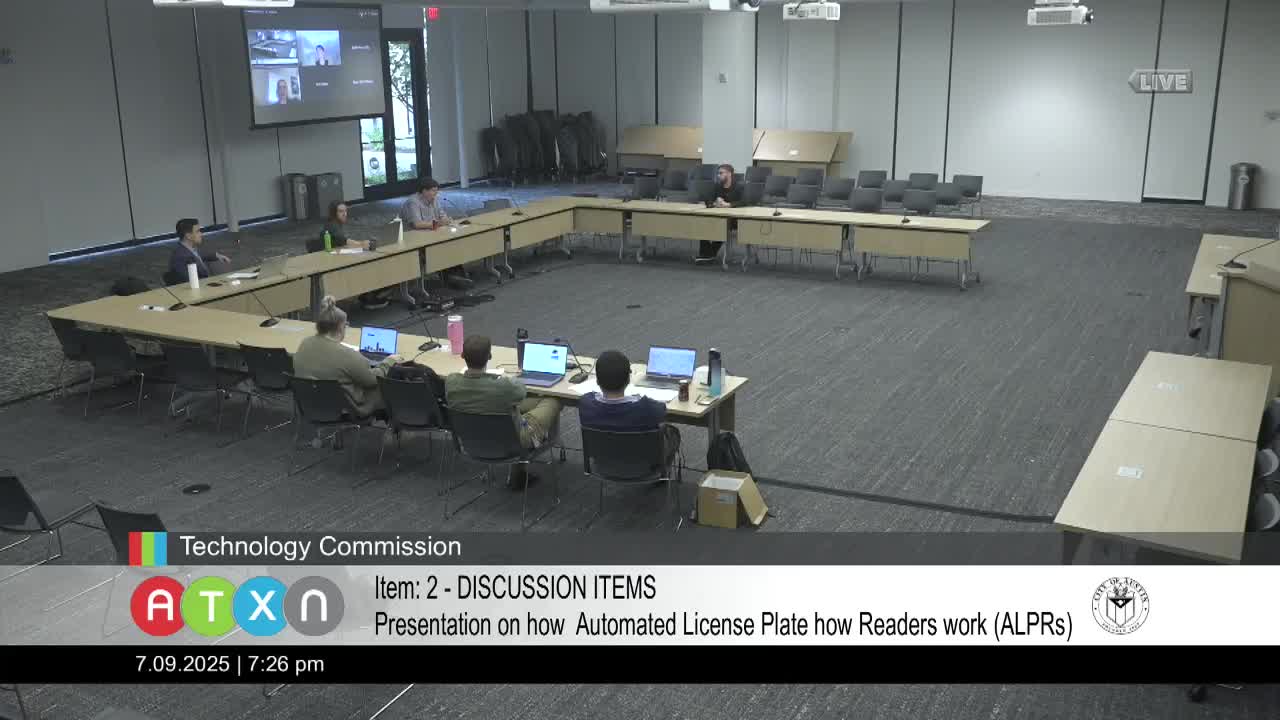Commissioners discuss ALPR data ownership and retention at Austin public surveillance workgroup
July 09, 2025 | Austin, Travis County, Texas
This article was created by AI summarizing key points discussed. AI makes mistakes, so for full details and context, please refer to the video of the full meeting. Please report any errors so we can fix them. Report an error »

During a recent meeting of the Austin Technology Commission on July 9, 2025, significant discussions centered around the use of Automated License Plate Readers (ALPRs) and their implications for public safety and privacy. The meeting highlighted the low success rate of ALPRs, with only 0.02% of scanned records resulting in matches with the "hot list" of vehicles associated with criminal activity. This statistic underscores the challenges law enforcement faces in balancing effective surveillance with the potential for infringing on the rights of innocent individuals.
Commissioner Combi raised questions regarding the operational statistics of ALPRs, prompting a detailed explanation of the technology's functionality and its widespread adoption across Texas. It was noted that nearly all states utilize ALPRs, with 75% to 90% of mid-sized and larger cities employing this technology. The discussion also touched on the Texas Department of Public Safety's involvement with ALPRs, indicating a robust framework for automated license plate recognition in the state.
Further discussions led by Commissioner Heritage focused on critical themes of data retention and ownership. The need for transparency in how data collected by ALPRs is managed and shared was emphasized, particularly concerning partnerships with private vendors like Flock. The commission expressed interest in exploring these issues further, particularly the risks associated with transferring public data into private datasets and the implications for community privacy.
The meeting concluded with a commitment to continue these discussions in a smaller work group dedicated to public surveillance, aiming to address the complexities of data management and the ethical considerations surrounding the use of surveillance technology in Austin. As the city navigates these challenges, the outcomes of these discussions will be crucial in shaping policies that protect both public safety and individual rights.
Commissioner Combi raised questions regarding the operational statistics of ALPRs, prompting a detailed explanation of the technology's functionality and its widespread adoption across Texas. It was noted that nearly all states utilize ALPRs, with 75% to 90% of mid-sized and larger cities employing this technology. The discussion also touched on the Texas Department of Public Safety's involvement with ALPRs, indicating a robust framework for automated license plate recognition in the state.
Further discussions led by Commissioner Heritage focused on critical themes of data retention and ownership. The need for transparency in how data collected by ALPRs is managed and shared was emphasized, particularly concerning partnerships with private vendors like Flock. The commission expressed interest in exploring these issues further, particularly the risks associated with transferring public data into private datasets and the implications for community privacy.
The meeting concluded with a commitment to continue these discussions in a smaller work group dedicated to public surveillance, aiming to address the complexities of data management and the ethical considerations surrounding the use of surveillance technology in Austin. As the city navigates these challenges, the outcomes of these discussions will be crucial in shaping policies that protect both public safety and individual rights.
View full meeting
This article is based on a recent meeting—watch the full video and explore the complete transcript for deeper insights into the discussion.
View full meeting
